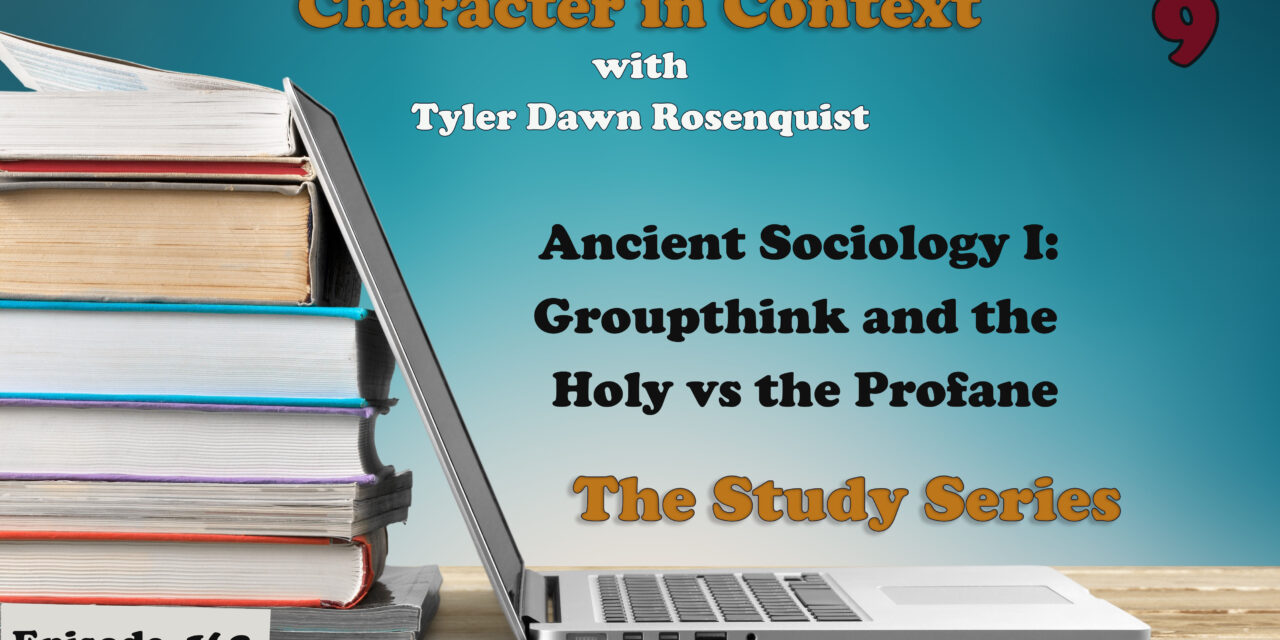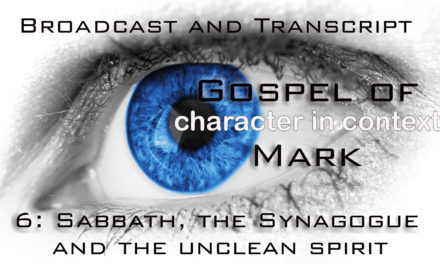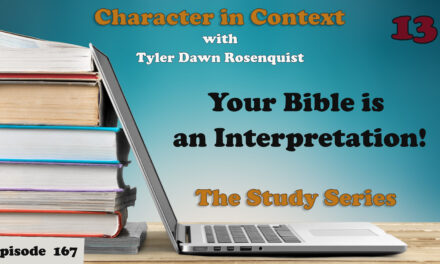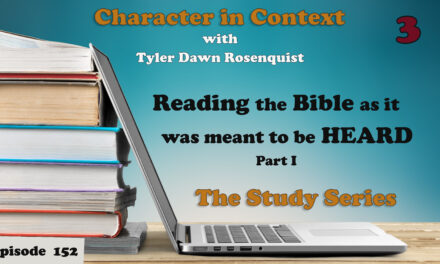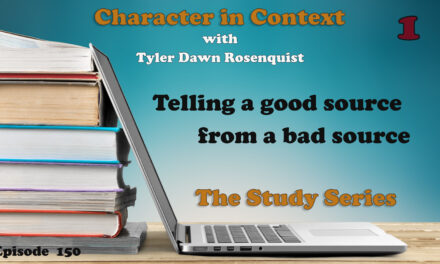Anyone who knows me knows that ancient sociology is my absolute favorite aspect of Biblical context. Today we’ll talk about the ancient community identity, and the differences between Holy and Profane/Common as well as Clean vs Unclean. They are all entirely different but once you understand them, the Bible makes a whole lot more sense!
(My affiliate links for Amazon products are included in the post. As an Amazon Associate, I earn from qualifying purchases.)
If you can’t see the podcast player, click here.
Hi, I am Tyler Dawn Rosenquist and welcome to Character in Context, where I usually teach the historical and ancient sociological context of Scripture with an eye to developing the character of the Messiah. But not right now, right now I am doing a series about how to not waste your time with bad study practices, bad resources, and just the general confusion that I faced when I started studying the Bible and was trying to figure out what to do and whose books I should read. Bottom line, I read a lot of nonsense and spent a ton of money on it. I am going to give you some basics on how to avoid a lot of the pitfalls, save money, maximize your time and effort, and get the most out of what you are doing. So, what we are doing here is getting you introduced to summaries of what is out there to study and things you should know about. Master book list can be found here and I will add to it as needed.
Words are really important and so is the context of the ancient world and there are a lot of terrible teachings out there from people who aren’t linguists (or don’t have access to linguists) and who haven’t made an attempt to study the ancient world and maybe don’t even understand how incredibly unlike ours it is. Different enough that just about any assumption we would make about them and why they did what they did or believed what they did would be wrong. Just as an example, I saw a teaching the other day that was forwarded to me where someone who is not educated in Biblical context was decrying ancient Near Eastern (ANE) context studies. To me, that is just mind-boggling. Yes, those studies can change how we see things and many times they will show us that we are dead wrong (like the sermon I sat through where Abram was called hen-pecked because he agreed to have a child with Hagar) but that isn’t a bad thing, finding out when we are wrong, it is a good thing. It makes us better readers, better teachers, and better preachers because context reigns in our imaginations. There are assumptions we make that are just 180 degrees in the wrong direction.
Now, I am not telling you that you can’t understand anything unless you understand languages and context—I mean, truly, we can understand the basic metanarrative of Scripture quite well without any of that—which is God’s character and His rescue plan for humanity after the fall and a return to perfect fellowship with Him. All that is easier to understand with context and language, but no one needs to have a PhD to read what Yeshua/Jesus is saying and understand that we are called to lives of radical love, forgiveness, service, and self-sacrifice. Sometimes, the people who know that best don’t even own Bibles. So don’t get me wrong—I am talking to people who want to study and teach with more understanding and accuracy. I am not saying that it will necessarily make you a better person or greater in the Kingdom—because a whole lot of people know a lot and are insufferable, or even atheists. So, I don’t want anyone to feel judged—that isn’t the case. But, when we have a belief that gets knocked down by context, it is wrong-headed and arrogant to just throw out context studies. Instead, we have to dig in and re-evaluate. I have to do that all the time and I love it. Just yesterday, I was taught something about “boiling a kid in its mother’s milk” that has me reeling and is changing the way I have always taught it. And I guess I can’t just leave it at that, right? But agriculturally, and with where the verses show up, it would make logical sense to interpret that as not removing a young animal from its mother before it has been weaned in order to sacrifice it. Anyone who has ever worked in a ranch setting knows how upsetting that is to mom and baby and it just isn’t optimal for either. I will link the book (affiliate link) I have been reading in the transcript, and I will put it in the main book list.
Some of this information will be review and some of it will be new so hang in there, repetition is good for learning. First, I want to talk about “groupthink” which in modern times describes the downfall of a group coming to a consensus on something based on not wanting to upset the group or to subvert tradition instead of relying on critical thinking and an analysis of how things would work better. Welcome to the ancient world! Why was Abram not henpecked when he agreed to Sarai’s demands that he father a child with her slave? Because that’s the way things were done in the ancient world and we know that from studying ANE law codes from Israel’s neighbors—from the Hittites to the Babylonians. Sarai had a legal right to demand this according to the common law of the ancient world. As scholars like to say, it was the common water that everyone was drinking from in those times. Abram wouldn’t have questioned either the request or even the wisdom of it. Even though we are rightly appalled and grossed out by it now.
Ancient sociology, the study of social groups and interactions, is very different from the way that Westerners view the world. Almost entirely different. They weren’t particularly introspective or inward thinking. Their opinions of themselves were entirely based upon what the rest of the community thought about them. Their ideas about right and wrong were also community based. They were very slow to question how things had always been done because the fact that they were still alive supported the idea that the old ways were the best and new ways were risky and would possibly offend the gods. Their identity was embedded in the past and not in the future—they looked backward and not forward to discover who they were (which is why Abram leaving his clan was such a radical thing for Yahweh to ask). People who fundamentally changed their identity or loyalties (like Paul when he came to be identified by Yeshua-based Judaism or when Moses returned from the wilderness a changed man) were considered to be suspicious or unhinged. Bucking the system got people killed, and so did subverting the social order, as far as they were concerned—which is why we see so very little innovation in the ancient world, as compared to now when we are always wanting something new and avante garde. Family relationships were nothing like ours in many ways. Mothers were very close to their children and especially to their first born sons because they would have an ongoing, lifelong relationship, while daughters were being trained to leave and join another family. Husbands and wives and fathers and children had very limited relationships with each other as their social spheres were entirely different with men engaging the outside world and women confined to the household and to the company of relatives, although social status could change that dynamic, and boys not really having much to do with men until they came of age. And so, if we are reading the Bible accounts of the patriarchs and monarchy and imagining the western nuclear family, we are going to make a lot of bad judgment calls about what life looked like for them and how they even felt about each other. This becomes especially problematic when we look at the metaphors of Yahweh as father, mother, husband, bridegroom, master, or any of that. And especially the “Jesus as boyfriend” theology, which is more rooted in the romantic literature of the last five hundred years than anything that would have made sense to them at the time.
Into this mix, we can add the importance of understanding honor/shame dynamics, hospitality demands, and covenant theology so that we can be clear on how they related to one another. When we do, a lot of what we see on the page just springs to life and along with the “well, that is super messed up” responses, we can also empathize with them that this was what made sense within their culture. I remember the day, when I was reading Neyrey’s The Social World of Luke-Acts: Models for Interpretation (affiliate link) and it all just clicked and I began to be able to think like they would think and it was just a mind blowing, and sometimes very disturbing, experience. I thank God for the people who studied this stuff because I could have looked at the Bible for a million years and would have never gotten it. Another important aspect of sociology is understanding the difference between clean and unclean and holy and common/profane. And actually, that is so important that I am going to talk about the importance of that in ancient cultures now and do the weird science and linguistics lesson next week.
When people first begin studying the Hebrew Scriptures, the whole clean/unclean and holy/profane thing can really be derailing and it is so easy to get the wrong idea. The first person to teach me about it had absolutely no clue what it meant and he treated them like sin issues when really, they are all about what things are and aren’t good for and where they do and do not belong and how to change the status of things and people through rituals. As far as understanding Holiness goes, you cannot do better than to read Joshua Berman’s book The Temple (affiliate link) and I believe that is chapter four. Just so life-changing. As for purity issues, DeSilva’s Honor, Patronage, Kinship and Purity (affiliate link) is a great workup on a lot of the concepts I have been mentioning this week. It’s a terrific crash course and then you can read everything else he writes as well!
Holiness is a conferred status—no one can just decide to be holy and, in fact, humans aren’t holy. A community can be holy, as is Israel/the Body of Messiah because as a group we have been granted that status as a royal priesthood. But I am not holy myself. We are holy. Jobs can be holy because the status of the job is conferred by Yahweh and there is a ritual anointing. So, as a teacher I am not holy, okay? But together we are a holy nation. But, the priests were holy and therefore set-apart by God with a special status that allowed them to do what no one else could—namely make sacrifices, handle the blood of the sacrifice, do the work of the outer altar and within the Holy Place. That status was conferred upon them based upon their lineage and not because of their character. They could access places that average Israelites couldn’t, despite the rest of the nation being holy. There is holy and “holy enough” and as laymen, their status as a royal priesthood was not holy enough to touch the sacred things and to be in certain areas. There wasn’t anything wrong with them, they just didn’t have the holy job—for example, they couldn’t diagnose or announce someone with a skin condition as clean or unclean. The High Priest had a status of even greater holiness, and he alone could perform the Yom Kippur rituals within the Holy of Holies once per year. He wasn’t holy enough to go in whenever he wanted to, nor did he have the holiness required to forgo the rituals that made him acceptable to enter.
The opposite of holy is common or profane. And let me tell you right now that there is absolutely nothing wrong with anything that is either common or profane. It just means that it is something that is, for lack of a better word, normal. The Sabbath is holy, but the other six days or the week are normal days, or common or profane. On normal days, we do normal things. We work, and work is good but it just isn’t appropriate for the Sabbath. So, the Sabbath is a day of elevated importance and so we are careful not to violate it lightly—as best we can given that we are not living in a society that makes Sabbath keeping easy and especially not for young people or for the poor. Our society is not at all tuned into the concept of holy vs profane and so we live largely profane lives, not observing much of anything as set-apart or special. Ancient Israel, on the other hand, was supposed to just operate that way permanently and modern Israel actually does a pretty good job of shutting the world down on the Sabbath.
Holy and profane also come into play when we are studying the concept of places and spaces. The closer a person got to the Holy of Holies in the Temple or Tabernacle, the greater the level of holiness was and shoes had to be removed and higher levels of ritual cleanliness had to be observed. However, no matter how ritually clean a person was, they could still only get so close to the holiest precincts of the Temple. And no matter the holiness of the priestly position, if they were ritually unclean, they could only come within certain distances of the holy places. And this is because they are entirely different things. By the way, your church or synagogue isn’t holy ground. Your pastor or rabbi isn’t holy. Actually, a lot of things that we call holy actually aren’t. Only God can set apart something as biblically holy. We can’t do that, no matter how precious something is to us.
To segue into the difference between holy/profane and clean/unclean, let’s talk about Mt Sinai. This is where Moses had the encounter with the burning bush and was commanded to remove his sandals because the ground he was standing on wasn’t common, normal, regular ground but holy ground. There is nothing wrong with normal ground—the National Parks are all profane ground and yet they are still awesome because God’s creation is good, and we can feel closer to God there because the beauty and solitude can make us more attuned to His presence, but there is nothing holy about it. Yahweh told Moses that the proof that it was Him sending Moses back to Egypt was that they would return to that very mountain to worship Him. And Moses would have understood that as Yahweh declaring Mt Sinai as a nexus point where heaven and earth overlap—a holy spot. All religions, by the way, understand this concept of sacred ground being a place where they can come in contact with the divine not simply spiritually but also physically or almost physically when there is an idol involved.
When they returned, we get introduced to the concept of clean vs unclean—which they would have understood from living in Egypt and quite possibly from the legacy of Noah, who understood the difference between animals that were clean and unclean for sacrificial purposes. This was actually common knowledge in the ancient world. And still today—all cultures acknowledge that things need to be in their proper place and that everything is good for something. But maybe not ticks. Anyway, the children of Israel and the mixed multitude finally came to Sinai and that’s when things got really scary and intimidating. Yahweh tells Moses that the people must ritually bathe and wash their clothing and abstain from sexual relations for three days. Is it because they were dirty and dusty? Nope. Is it because sex is somehow original sin? Nope. They were participating in the ancient understanding that how we approach someone or something is a measure of how much honor/reputation they have or are owed. Yahweh was saying, “I delivered you from Egypt with a mighty hand and outstretched arm and you are not going to casually come into my presence without a status change from unclean to clean. In the outside world, you can be unclean and it is actually unavoidable and not sinful, but when you come before my throne, you have to think differently and act differently and recognize that you musty treat me and my presence differently than absolutely anything else in the world. I am unique and you will treat me as unique.”
When I teach this to the kids, I tell them that if they were going to visit Queen Elizabeth—whoops, it is hard to get used to not saying that anymore—or King Charles, they would be on their best behavior. They wouldn’t show up to the palace with smudged faces or in the worst clothes they have. They would want to be respectful to their host (and this goes for visiting other people’s houses as well) and to show their host that they appreciate the invitation and are taking it seriously. If they got a call from King Charles, they wouldn’t say “Yo, Charlie dude! ‘Sup?” That would be something their close friends might like to hear but it isn’t for strangers or for VIPs. And so, being ritually clean in the physical presence of Yahweh or His Temple wasn’t optional. To show up just however would be insanely disrespectful and cheeky. You wouldn’t go, for example, right after having sex or if you were leaking pus or infection everywhere, or having your period or having a seminal emission. All of these things made someone not sinful but unclean. It also didn’t remove their holiness status because they were still Israelites who were in covenant with Yahweh (or at least they would be after this event at Sinai) but it did limit how close they could get to the presence of Yahweh in His holy precincts because that was just a whole level of specialness. It was considered to be the most important place on earth, wherever Yahweh was.
The washing wasn’t really to make them clean as we would think of clean, but it was to change their status—it got them ready to be in the presence of the King and when you spend three days bathing yourself and washing your clothing and not having sexual relations with your spouse, it causes you to think about life and about God differently. Not in such a way as to degrade their normal lives—they couldn’t exactly be fruitful and multiply without sex, nor could a woman even get pregnant if she wasn’t menstruating normally, and giving birth wasn’t at all sinful, nor was being sick. And they totally understood that but they also understood that not everything is okay for everywhere. Belching and having gas around a campfire with your buddies is entirely different than letting it all rip when in a crowded movie theater. The body functions are quite natural but they have their place. Being aware of when and where things are and are not appropriate is really helpful in understanding the difference between clean and unclean. A live pig, for example, isn’t unclean. It isn’t unclean until it is dead and then it is unclean for eating. But God made them and they are excellent garbage disposals. They are good for the purpose for which they were created and everything has a use, but it doesn’t mean that everything is food. Soil in the garden is good but when we bring it in the house, we call it dirt. Having dirt in the house isn’t usually about sin, it’s just inevitable. And so, when we see it, we put it back outside where it belongs. So when the Bible says that something is clean, it means that it is whole and where it is supposed to be. If the Bible says something is unclean, it means that it isn’t optimal and something is somehow off. A woman having her period, for example, isn’t really feeling up to snuff and so thank God that He made her off limits (unclean) sexually for the duration. The difference between unclean and clean is generally just time and ritual washing. That’s it. Plus, we also have to ask the question, “Unclean for what,” because there is a big difference between shunning someone and just keeping them away from the Temple, right?
Another word that can be applied to the concepts of clean and unclean is taboo. And something that is taboo is simply something that society has declared inappropriate or forbidden and in the Bible, that would generally be translated as detestable or abominable. There were things done by the Hittites and the Amorites, for example, that Israel was to completely separate themselves from. For example, incest, bestiality, and necrophilia. Also, and we see this in Sodom, although the ancient Near Eastern world generally did not frown upon a man penetrating another man sexually, yet shamed his victim (which was super messed up), God said, “Um, no, the person doing the penetrating is committing an abomination,” which therefore eliminates the problem entirely. I tell you, the ancient world was messed up—where the victims of sexual assault were shamed but the perpetrators given a high five unless the family took revenge. Scripture tells us that, as opposed to the “ANE way”, all sexual assault victims were to be seen as no different than murder victims—innocent and blameless.
And this is important to Bible study, understanding the cultural mindsets and the sociology of the people of the ancient world because it will keep us from making errors that are based upon modern assumptions. And frankly, when we begin to understand these people, we can better appreciate why a lot of the Torah was given the way it was so that we aren’t creating disastrous doctrines based upon what we think we are seeing as God’s ultimate will. Next week, we will talk about weird science, linguistics, and henotheism.

